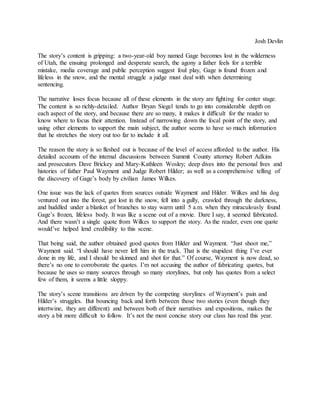
A father's pain, a judge's duty, and a justice beyond their reach analysis
- 1. Josh Devlin The story’s content is gripping: a two-year-old boy named Gage becomes lost in the wilderness of Utah, the ensuing prolonged and desperate search, the agony a father feels for a terrible mistake, media coverage and public perception suggest foul play, Gage is found frozen and lifeless in the snow, and the mental struggle a judge must deal with when determining sentencing. The narrative loses focus because all of these elements in the story are fighting for center stage. The content is so richly-detailed. Author Bryan Siegel tends to go into considerable depth on each aspect of the story, and because there are so many, it makes it difficult for the reader to know where to focus their attention. Instead of narrowing down the focal point of the story, and using other elements to support the main subject, the author seems to have so much information that he stretches the story out too far to include it all. The reason the story is so fleshed out is because of the level of access afforded to the author. His detailed accounts of the internal discussions between Summit County attorney Robert Adkins and prosecutors Dave Brickey and Mary-Kathleen Wosley; deep dives into the personal lives and histories of father Paul Wayment and Judge Robert Hilder; as well as a comprehensive telling of the discovery of Gage’s body by civilian James Wilkes. One issue was the lack of quotes from sources outside Wayment and Hilder. Wilkes and his dog ventured out into the forest, got lost in the snow, fell into a gully, crawled through the darkness, and huddled under a blanket of branches to stay warm until 5 a.m. when they miraculously found Gage’s frozen, lifeless body. It was like a scene out of a movie. Dare I say, it seemed fabricated. And there wasn’t a single quote from Wilkes to support the story. As the reader, even one quote would’ve helped lend credibility to this scene. That being said, the author obtained good quotes from Hilder and Wayment. “Just shoot me,” Wayment said. “I should have never left him in the truck. That is the stupidest thing I’ve ever done in my life, and I should be skinned and shot for that.” Of course, Wayment is now dead, so there’s no one to corroborate the quotes. I’m not accusing the author of fabricating quotes, but because he uses so many sources through so many storylines, but only has quotes from a select few of them, it seems a little sloppy. The story’s scene transitions are driven by the competing storylines of Wayment’s pain and Hilder’s struggles. But bouncing back and forth between those two stories (even though they intertwine, they are different) and between both of their narratives and expositions, makes the story a bit more difficult to follow. It’s not the most concise story our class has read this year.